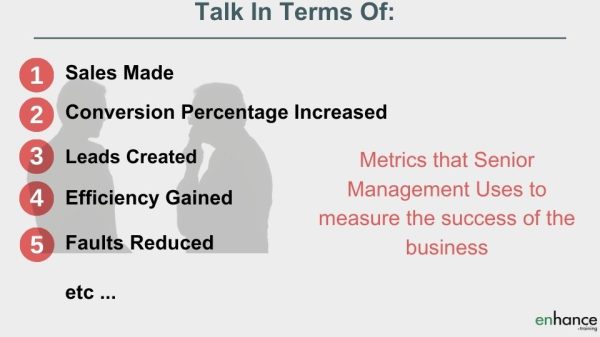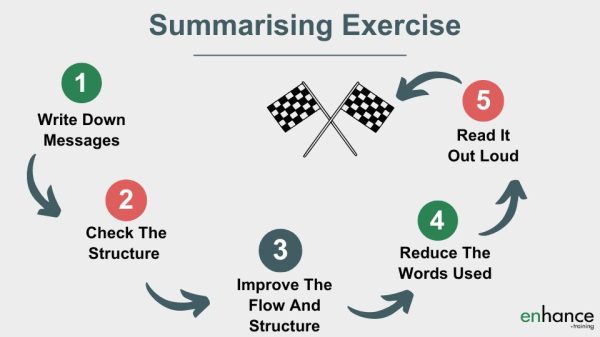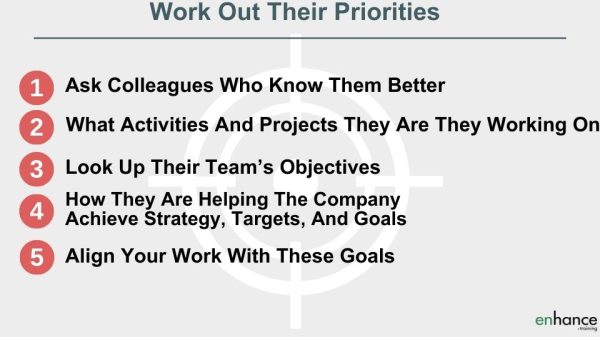6 Tactics to Talk Effectively To Higher Ups; Be Persuasive Like A Boss

Learning how to talk effectively to higher ups is a big deal for your confidence and career prospects. Talking to upper management is daunting, scary, and intimidating. It’s hard to get their attention. They come across as impatient and abrupt. Somehow, they know exactly which questions to ask to find the weaknesses in your argument. It is almost as if higher ups expect you to talk their language to get their attention. Before they take you seriously, you have to get past the barriers they put up.
As soon as you learn how to communicate effectively with higher ups, you instantly get on their radar, they take you a lot more seriously, they listen to your ideas, opinions, and solutions and they start to see you as promotion potential.
6 tactics to talk effectively to higher ups; Be Persuasive Like A Boss
- Focus on impact and benefits, not process
- Get straight to the point
- Talk to their top concerns
- Work out the flaws before they do
- Believe in what you are saying
- Be open and honest
You will also feel a lot more confident. Your fear and unease will go, leaving you relaxed and yourself – which makes talking effectively to higher ups a lot easier. You will build better relationships and gain a lot more trust from these senior managers.
Watch on YouTube
Listen on Podcast
focus on impact and benefits, not process – The first tactic to talk effectively to higher ups
Bosses care about results. They care about the impact or benefit your idea or solution will give to them, their team, or the business. Impacts and benefits are how their personal performance is measured. Activity only matters to them in terms of how much more likely a result or benefit will be achieved.
Activity and the process to get the results and benefits are your responsibility. Higher ups only want to hear about them if they doubt you will deliver the results and benefits or they want to check if they can think of a better or quicker way of achieving the same result.
To talk effectively to higher ups, focus first on the impact and benefits you will bring to them, their team, or the business.
Add numbers to the impact or benefits to communicate effectively with higher ups. You need to make what you say specific, not general. If you can talk financial impacts and benefits with higher ups – i.e. revenue, costs, or profits – brilliant. If not, talk in terms of sales made, conversion percentage increased or leads created, or efficiency gained, or faults reduced. Be specific and use numbers to clearly define the impact or benefit in a clearly measurable way.

get straight to the point – Tactic two
Upper management is time poor. They don’t have the time or energy to decipher long winded un-structured communication. They want you to make what you tell them to be easy to take in, understand, and action. Tell the manager or leader what you want. Talk in terms of:
- A decision
- Permission
- A course of action
- Resources
Be clear what you want from them and communicate this at the start. Then you can go into the context, followed by the detail of why you are asking. When you communicate with higher ups, give them time to think and ask questions.
A clear structure helps you talk clearly and concisely to upper management.
Before you speak to higher ups, plan out how you are going to summarise what you want to say. How to make clear and concise points like a boss would – requires you to think through the key and most relevant points before talking to them.
A Good Exercise
Write down what you want to say, which forces you to articulate concepts clearly. Check the structure of what you have written. Does it flow logically from one point to the next? Does it have a start middle and end? Now try to improve the flow and structure. Once you are happy, start trying to reduce the words used. Write and re-write. Keep removing words until you start to lose the meaning. Finally, read what you have written out loud. How does it sound? Ask yourself, is it clear and understandable? Make your final amendments. This process will feel long winded to start with.
The more you practice doing this, the quicker and quicker you will get at it. Eventually, you will be able to create clear concise communications which get straight to the point in a few minutes largely in your head.
Keep practicing so you speak clearly, concisely and get straight to the point.

talk to their top concerns – The third tactic to communicate with higher ups
The better you know your audience, the more effectively you will communicate with them. Start talking about how you can solve a pressing problem a manager has; they will eagerly listen to you. Talk about a high priority for you, but a low priority for them and you’ll be lucky to get any of their attention.
Always make the time to work out what the bosses’ priorities are. Ask colleagues who know them better. Find out what activities and projects they or their teams are working on. Look up their team’s objectives. Figure out how they are helping the company achieve strategy, targets, and goals. Align your work, ideas, and solutions with these goals if you want to get heard by senior management.
Frame what you want in terms of how it helps them or their teams. Don’t communicate the benefits to you; communicate the benefits to them.
work out the flaws before they do – The fourth tactic to talk effectively to higher ups
Senior management and bosses have this uncanny knack of spotting any flaws in ideas, solutions, arguments, and data. They have learnt how to ask the right questions to expose problems and issues.
Bosses will nearly always ask a few questions to check that you have spotted the obvious issues and hopefully the less obvious ones too. If you don’t give good answers to their questions asked, don’t expect to get any further.
Put in the time to look at your idea, solution, argument, and data from different perspectives. Try to put yourself in their shoes and work out what questions they might ask. Work out how you are going to answer these questions. When you spot any flaws or weaknesses, work out how you will avoid or mitigate these. Being aware of the potential problems is half the battle.
Work out the flaws before the higher ups to and you instantly gain more credibility, trust and confidence in their eyes. If you can’t a question, make sure you get back to them quickly with the answer. Don’t try to bluff your way through.
Preparing in this way does takes time. It takes a lot less time than having a flaw spotted that you didn’t know about. You will then have to answer a ton of extra questions. If you get through these, you will then need to work out solutions and changes under pressure. Finally and hardest of all, you will need to rebuild their damaged confidence in you.
Consistently spot the flaws before they do and you steadily reduce the questions and challenges while gaining a lot of trust and respect.

believe in what you are saying – The fifth tactic
Most bosses know that the more belief you have in what you are talking about or asking, the higher the chance you have done the hard work to arrive at a great idea or have built a good solution. Your bosses have been in your shoes and have learnt these lessons the hard way.
Bosses look carefully at a person’s confidence. The more confident you are, the less your bosses will question and challenge you.
The best way to gain confidence is to do your homework before talking with higher ups. Carefully put together the impacts and benefits of what you are communicating or asking for. Go through everything and work out any flaws in your ideas, data, or arguments. Plan out solutions or mitigations. Summarise so that you can talk clearly, concisely and with an easy to understand structure. Gather and organise the data to back up what you are talking about or asking for. Then get straight to the point.
To talk effectively to higher ups, do the work to build your confidence so that you really believe in what you are saying and you are prepared for their questions.

be open and honest – The sixth tactic to communicate with higher ups
Building trust and credibility with upper management takes time and effort. Try to pull the wool over their eyes and you can lose it all in seconds.
Good bosses can smell BS a mile away so be honest with what you say. Answer their questions truthfully and accurately rather than evasively. The minute you start trying hide things, or reduce their visibility of what is happening, you lose their trust and confidence in you. I guarantee this will leave you worse off.
When you have done the background work properly, you don’t need to hide issues, omit information, or be dishonest.
The long term damage to your credibility and senior management’s trust and confidence in you is not worth trying to fool bosses. Try and your career progress will stop. Instead, put the work in and create strong ideas, solutions, arguments and data sets. You will be massively better off in the long run and build a lot more credibility. Always be open and honest.
In summary
Talking effectively to higher ups is a skill to be mastered. Communicating with upper management starts off feeling scary, intimidating and daunting. Implement each of the tactics we have been through today and it won’t be long before you start feeling a lot more comfortable to talk clearly and concisely to upper management. Your communication will become a lot more interesting and persuasive to your bosses.
We have been through these 6 tactics to talk effectively to higher ups:
- Focus on impact and benefits, not process
- Get straight to the point
- Talk to their top concerns
- Work out the flaws before they do
- Believe in what you are saying
- Be honest and open
If you have any questions on “6 Tactics To Talk Effectively To Higher Ups; Be Persuasive Like A Boss”, please email me at support@enhance.training and I will get back to you
Learning how to communicate and talk effectively to higher ups was personally a challenge. Early in my career, I was shy and very nervous around those I felt were in important positions. It took quite a bit of exposure to senior staff early in my career before I really grasped what was needed and to get to the point where I was confident.
I became confident by working on the 6 tactics I have outlines in this post. They have worked amazingly well for me and I know they will be very useful for you too.
Jess






